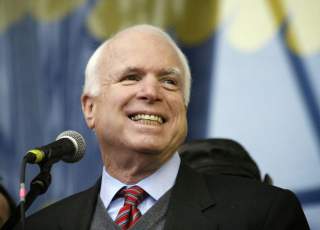GOP Defense Hawks Take Flight
Republican hawks are embattled. The 2016 election will reveal whether they can go back on the attack, or whether a series of protracted conflicts abroad has finally rendered them impotent and obsolete.
Unfortunately for Romney and his backers, a war-weary American public already saddled with $16 trillion in national debt just wasn’t buying.
With potential Republican presidential candidates beginning to position themselves for the 2016 election, however, some defense hawks are returning to the party nest. In recent speeches and comments Ted Cruz has embraced more muscular foreign-policy positions, publicly differentiating himself from the views of Rand Paul. So has Senator Marco Rubio, who hired Jamie Fly, a former head of William Kristol’s Foreign Policy Initiative, as his foreign-affairs aide. At the same time, the House recently passed Paul Ryan’s budget calling for increases in defense spending. And in a recent speech at the Virginia Military Institute, House Majority Leader Eric Cantor issued a full-throated call for renewed American leadership in the world, arguing that allies today “see a divided, inward-looking America that is focused on its weaknesses rather than its strengths, and they know this is an America that invites challenges and emboldens adversaries.”
But it is Rand Paul who is most forcefully challenging such stances. As a result, Paul has come under attack from not just McCain but also a phalanx of neocons and conservatives. Rich Lowry, the editor of National Review, attacked Paul for “dewy-eyed foolishness” about foreign affairs. In a recent op-ed in National Review, Paul responded. He took issue with what he called “today’s young aspiring Buckleyites,” who “sharpen their knives to carve up conservatives who propose a more realist and nuanced approach to foreign policy.” William F. Buckley Jr., Paul said, was more of a realist than a crusading interventionist, and conservatism has long had a “strain of libertarianism.” So the battle between the two sides has now been joined. The 2016 election will likely reveal whether the hawks can once more go on the attack against the realists, or whether a series of protracted conflicts abroad has finally rendered them impotent and obsolete.
James Kitfield is a senior fellow at the Center for the Study of the Presidency and Congress and a contributing editor at National Journal.

